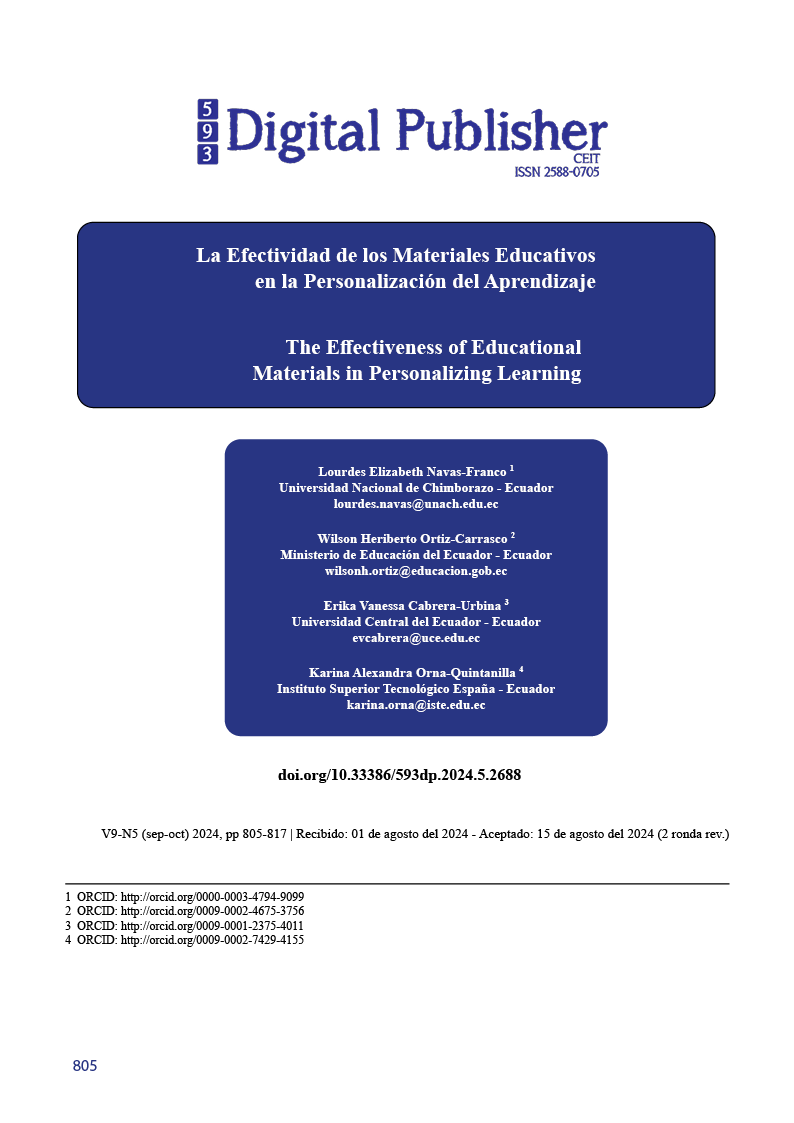The Effectiveness of Educational Materials in Personalizing Learning
Main Article Content
Abstract
This article, titled "Effectiveness of Educational Materials for the Personalization of Learning" are teaching resources designed to adapt to the individual needs, interests and abilities of students. This study aims to identify the contribution that different types of materials provide. educational contributions to the personalization of learning. The methodology used is the bibliographic and documentary review, which analyzes the strategies proposed by researchers focused on the access and availability of technology, the training of educators, the impact on social skills, time management and motivation, and the collection and processing of information. . The results of the study indicate that personalized educational materials can significantly improve understanding and retention of knowledge, as well as increase student motivation and engagement. This article provides a theoretical and practical framework that demonstrates that personalizing learning through appropriate educational materials not only improves academic performance, but also fosters greater involvement and satisfaction among students, promoting deeper and more lasting learning. The conclusions highlight the importance of the teacher's role in the selection and adaptation of these materials to maximize their effectiveness. Challenges and limitations, such as the need for teacher training and access to appropriate technology, are also addressed. Strategies to overcome these obstacles are identified and recommendations are proposed for future studies and educational practices.
Downloads
Article Details

This work is licensed under a Creative Commons Attribution-NonCommercial-ShareAlike 4.0 International License.
1. Derechos de autor
Las obras que se publican en 593 Digital Publisher CEIT están sujetas a los siguientes términos:
1.1. 593 Digital Publisher CEIT, conserva los derechos patrimoniales (copyright) de las obras publicadas, favorece y permite la reutilización de las mismas bajo la licencia Licencia Creative Commons 4.0 de Reconocimiento-NoComercial-CompartirIgual 4.0, por lo cual se pueden copiar, usar, difundir, transmitir y exponer públicamente, siempre que:
1.1.a. Se cite la autoría y fuente original de su publicación (revista, editorial, URL).
1.1.b. No se usen para fines comerciales u onerosos.
1.1.c. Se mencione la existencia y especificaciones de esta licencia de uso.
References
Álvarez Cadena, K. A., Pilamunga Asacata, D. E., Mora Alvarado, K. G., & Naranjo Kean Chong, M. K. (2020). Tiempo en pantalla (televisión, computadora, celular, tabletas) en las relaciones interpersonales entre niños de 8 a 12 años. Horizontes Revista de Investigación en Ciencias de la Educación, 4(15), 258-266.
Álvarez-Arregui, E., Rodríguez-Martín, A., Rodríguez-Fernández, C., González-Melgar, C., & Álvarez-Hevia, D. M. (2023). Organización y Gestión de Edusistemas en Transformación: retos, visiones y propuestas de mejora.
Arias Gonzáles, J. L., & Covinos Gallardo, M. (2021). Diseño y metodología de la investigación. Enfoques Consulting EIRL, 1(1), 66-78.
Arteaga Alcívar, Y. A., Guaña Moya, E. J., Begnini Domínguez, L. F., Cabrera Córdova, M. F., Sánchez Cali, F., & Moya Carrera, Y. (2022). Integración de la tecnología con la educación.
Chilan, L. F. G., Encalada, S. M. C., Viteri, M. Y. Y., Alava, M. V. C., & Aguirre, M. F. P. (2024). Datos Técnicos de Publicación Internacional Título: Educación Inclusiva y Diversidad.
Cruz, J. A. G., Villavicencio, I. E. S., Loli, M. B. L. C., Ipanaque, R. A., Peramas, J. J. T., & Coca, M. A. A. (2023). Capacidades en el sistema educativo hispano: aula invertida, inmersión digital y capacitación docente.
García, J. L. G., Ponce, J. L. T., Baque, R. C. P., Ponce, M. A. T., Pincay, O. F. V., & Jalca, J. J. R. (2023). Aprendizaje digital: estrategias y transformaciones en la educación y el aprendizaje. Editorial Internacional Alema.
González García, M. . (2022). La educación del siglo XXI. Claves para la personalización del aprendizaje a través de la neurodidáctica. Padres Y Maestros / Journal of Parents and Teachers, (389), 36–42. https://doi.org/10.14422/pym.i389.y2022.006
Guerrero López, K. A., & Santos Caballero, G. (2023). Aprendizaje cooperativo y principios del DUA para promover la educación inclusiva desde el rol del docente.
Hernández-Sampieri, R., & Mendoza, C. (2020). Metodología de la investigación: las rutas cuantitativa, cualitativa y mixta.
Maldonado, M. C. A. H., Márquez, J. D. J. R., & Gurrola, E. C. (2024). Innovación Pedagógica para la Inclusión Educativa en la Nueva Escuela Mexicana: Evaluación del Impacto y Desafíos: Pedagogical Innovation for Educational Inclusion in the New Mexican School: Impact Evaluation and Challenges. LATAM Revista Latinoamericana de Ciencias Sociales y Humanidades, 5(4), 1263-1274.
Marín Gutiérrez, R. M. (2024). La Influencia de las Tecnologías de Información y Comunicación en el saber y las Relaciones Interpersonales en el Centro de Formación en Seguridad de la Nación de la Universidad Nacional de la Seguridad (UNES).
Martín, E., Solari, M., De Vicente, J., Luque, M. J., Nieto, M., & Coll, C. (2018). La potencialidad del aprendizaje servicio para la personalización del aprendizaje escolar. RIDAS. Revista Iberoamericana de Aprendizaje-Servicio, (5), 37-61.
Medina, M., Rojas, R., & Bustamante, W. (2023). Metodología de la investigación: Técnicas e instrumentos de investigación. Instituto Universitario de Innovación Ciencia y Tecnología Inudi Perú.
Naranjo, G. R. T., Naranjo, L. Á. T., Sandoya, G. G. O., & Jácome, M. A. L. (2024). Transformando la educación: aplicaciones de visión artificial y procesamiento de imágenes en el aprendizaje personalizado. Revista Social Fronteriza, 4(4), e44323-e44323.
Piguave, A. V. L., Moreno, G. E. M., & Fabiola, M. (2024). DESARROLLO PROFESIONAL DOCENTE, POTENCIANDO LA EXCELENCIA. perspectivas, 83(1), 29-48.
Posso Pacheco, R. J., Ulcuango Ashqui, M. T., Morales Loachamin, L. A., Pastaz Revelo, G. P., & Jaramillo Hidalgo, L. A. (2023). Revolucionando la educación: Implementación efectiva de la tecnología en el aula. GADE: Revista Científica, edición especial, marzo 2023.
Rodríguez, M. R. (2020). Rol del docente y estudiante en la educación virtual. Revista Multi-Ensayos, 6(12), 28-37.
Salvador, C. C. (2018). Procesos de aprendizaje generadores de sentido y estrategias de personalización. Dosier Graó, (3), 14-18.
…..





